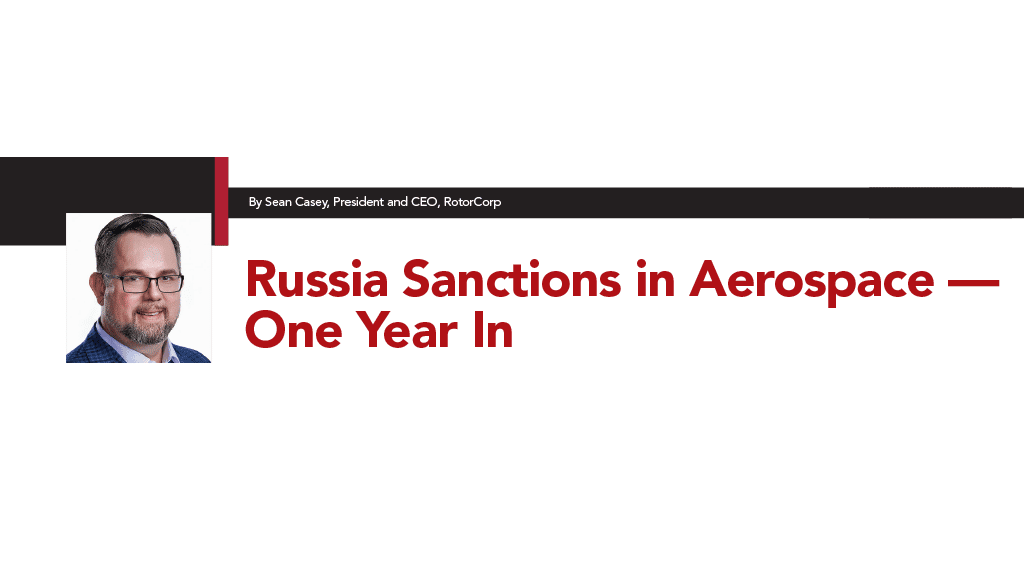Much of the world is now one year into the “new normal” of sweeping sanctions regimes imposed against Russia by the United States, the European Union and more than 30 additional countries in response to the invasion of Ukraine by the Russian Federation in early 2022. The effectiveness, rapid implementation and unparalleled scope of the Russia sanctions currently in place are the results of historical multilateral cooperation among the U.S. allies and partner nations. While sanctions and other restrictions affect nearly every aspect of the world’s eleventh-largest economy, the impact has been especially significant within Russia’s specifically-targeted aerospace sector.
Increasingly, U.S. aviation parts and service providers are at the front line of sanction enforcement. There are certain actions that can be taken by U. S. exporters to greatly reduce or eliminate the potential for inadvertent sanctions violations which carry steep civil and criminal penalties. Export compliance under the new sanctions can be manageable by even the smallest organizations.
Trade Attorney Michelle Schulz of Schulz Trade Law offers special caution for small exporters, “Some companies believe that because they are small, they are unlikely targets for Office of Foreign Assets Control (OFAC) enforcement action. However, it is especially important for small companies to understand and comply with U.S. sanctions regulations,” Schultz stresses, “OFAC fines and penalties can be exorbitant, so an enforcement action can easily become a ‘bet-the-company’ issue.”
Regardless of size, every exporting organization should frequently review and remain updated on official Russia sanctions. The U.S. Bureau of Industry and Security (BIS) and Office of Foreign Asset Control (OFAC) provide updated changes to restricted persons and entities as well as changes to sanctions and sanctioned goods and services.
Leandra Cain, president of Hurricane Aerospace Solutions and Board Member of the Aircraft Suppliers Association (ASA) recommends that organizations of all sizes avail themselves of their respective trade and industry associations which are increasingly serving as knowledge centers tracking sanctions information. Cain said, “Small Businesses should be actively working with trade associations such as ASA to instill knowledge and training to both importing and exporting aircraft products.”
It is very easy and advisable for exporters to develop a basic written Russia Sanctions compliance policy for their business and publish it on their website. By way of example, this is the compliance policy that Rotorcorp has posted on our website: https://rotorcorp.com/russia-sanctions/.
Most companies have “Terms and Conditions of Sale” stipulating compliance with U.S. and international trade laws. Your compliance policy may exercise a Force Majeure provision that frees both parties from obligation if an “extraordinary event” prevents both parties from performing. Both war and the imposition of trade sanctions are commonly accepted as extraordinary events. Your company legal advisor will need to determine your obligations once Force Majeure has been removed.
I also suggest that you enroll your organization in “Project Shield America” through U.S. Immigration and Customs Enforcement (ICE). Project Shield America prevents the illegal procurement of military items and controlled dual-use commodities, technology, and technical data. The PSA program specifically involves Homeland Security Investigation special agents are conducting outreach visits and providing presentation materials to various private industries – including aerospace companies.
Give extra scrutiny to new customers, especially those in countries not participating in the current sanctions against Russia, existing customers exhibiting unusual purchasing behavior, or customers with close geographic proximity to the Russian Federation – especially some former Soviet satellite states.
Use Bureau of Industry and Security Form 711 to establish an official Statement of Ultimate Consignee and Purchaser to collect information on new and existing customers. This form can be submitted for review to BIS.
About the Author
Sean Casey is the president and CEO of Rotorcorp — a provider of small helicopter parts to more than 3000 customers in 60 countries worldwide. Casey is a Certified Global Business Professional (CGBP) and is serving his second term as a member of the Industry Trade Advisory Committee (ITAC) for Aerospace Equipment in partnership with the U.S. Department of Commerce and the Office of the Trade Representative. Rotorcorp was recognized as the “Exporter of the Year” for the Southeast Region by the U.S. Small Business Administration in 2019. Learn more about Rotorcorp at https://rotorcorp.com.
